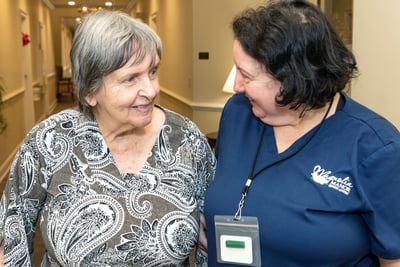Medicare: What's Covered & What's Not
Medicare Introduction
Medicare has been around since 1965, so it has become a household name. Nonetheless, many people make the mistake of thinking Medicare (along with Social Security) provides a catch-all safety net for every senior and their needs. Once you reach a certain age, your concerns about senior living are over, right?
.jpg?width=250&name=resident%20with%20pot%20Flower%20Planting%20(8648).jpg) No.
No.
Let’s be clear – Medicare and Social Security are not the same. One helps guard your health, while the other provides money to help you live a fuller life. Most seniors over a certain age receive both types of benefits. Even so, these programs do not address all aspects of senior living. They do have a few similarities, though. Both programs are federally-funded entitlement programs, available to everyone who meets the eligibility requirements. Both are administered at the national level, so the rules are the same in every state.
Both Medicare and Social Security provide benefits for certain individuals who are not seniors. However, in this article, we will focus on what Medicare can and cannot do for aging Americans.
Medicare is Health Insurance
Medicare is health insurance available to all adults once they reach their 65th birthday. (There are a few age exceptions if you are disabled or have a certain chronic, life-threatening condition.) You can sign up a couple of months before your birthday and be ready for benefits to kick in as soon as you turn 65. You don’t actually have to sign up for Medicare, but if you choose not to sign up at age 65 and then change your mind later on, you will pay higher monthly premiums.
 Yes, premiums. Some Americans mistakenly believe that Medicare is free, but that’s not the case. Nonetheless, it is a very good deal considering what is covered. We’ll talk about coverage options in a minute.
Yes, premiums. Some Americans mistakenly believe that Medicare is free, but that’s not the case. Nonetheless, it is a very good deal considering what is covered. We’ll talk about coverage options in a minute.
Medicare Is Not Medicaid
It is easy to confuse Medicare with Medicaid, since the names are so close, but they are quite different. Medicaid is also a federally mandated program designed to improve health care access and reduce costs for low-income citizens of all ages. But it is broader in scope than Medicare. Federal law defines basic mandatory eligibility and benefits requirements, but beyond those, each state can make its own rules. States also administer this program because they’re part of the cost.
Here in Georgia, you are eligible for Medicaid if you are at least 65 and need assistance with long-term care – that could be in your home or an assisted living facility as well as a skilled nursing center. The American Council on Aging warns that “eligibility is exceedingly complex.” They are right. Keep in mind, though, that even financially comfortable seniors often need Medicaid assistance to pay long-term health care costs.
We’ll talk more about Medicaid below when we discuss how to pay for things Medicare does not cover.
Social Security is a Retirement Savings Program
Most Americans who have worked during their lives have paid a percentage of their earnings to the Social Security Administration as a payroll tax. Employers contribute, too. When you reach a certain age, you can start receiving monthly Social Security retirement benefits (even if you have not actually retired). The amount depends on how much you earned throughout the years and your age when you start to receive payments.
 Other factors may be involved as well -- to your advantage -- so it pays to investigate. Use this Benefit Eligibility Screening Tool to learn about Social Security, Medicare, and Veterans benefits that might apply to you.
Other factors may be involved as well -- to your advantage -- so it pays to investigate. Use this Benefit Eligibility Screening Tool to learn about Social Security, Medicare, and Veterans benefits that might apply to you.
If you receive both Medicare and SSA, your Medicare premium is automatically deducted every month from your SSA benefit amount. If you join Medicare at age 65 but wait till you are older to start taking Social Security, you will receive a quarterly invoice for your premium amount, just as with any other health insurance.
While it is to your financial advantage to wait until age 70 to receive SSA, if you can, the opposite is true for Medicare. Waiting beyond your 65th birthday will raise your premiums when you do sign up.
Supplemental Security Income (SSI) is a separate federal program designed to help seniors (as well as blind and disabled individuals) who have no or very little income to pay for shelter, food and clothing.
Medicare Coverage Options
Medicare is designed to cover the costs of a wide range of health care services and items most commonly needed by seniors. Although it did not initially do so, Medicare now allows recipients to choose how they receive coverage – through Original Medicare or through certain private health insurance companies which are contracted to Medicare.
 This is great news, because you and your health are simply not the same as someone else’s. (And, let’s face it, not the same as a decade or so ago.) Having more choices makes it easier to find coverage that meets your specific needs and preferences.
This is great news, because you and your health are simply not the same as someone else’s. (And, let’s face it, not the same as a decade or so ago.) Having more choices makes it easier to find coverage that meets your specific needs and preferences.
You can change your mind, too. Just as with any private health insurance, there is an open enrollment period each year. (Medicare open enrollment ends the first week of December). During this time, you can review your current coverage and costs in terms of your current health status, then decide if you want to keep your current plan or change to another one that offers more or different benefits. Medicare makes changes and upgrades to Original Parts A and B each year, and Medicare Advantage providers also make changes to their coverage offerings and costs.
Original Medicare
Original Medicare is divided into two parts that categorize different types of care:
Part A – Hospital Insurance
This part of Medicare covers inpatient hospital stays, care in a skilled nursing facility, hospice care, and some types of home health care services. There is no monthly premium for Medicare Part A, but you will still have out-of-pocket expenses for copays and deductibles.
Part B – Medical Insurance
This part of Medicare covers things like certain doctors' services, outpatient care, and medical supplies as well as certain preventive services. You must pay a monthly premium for Part B. There are also deductibles that apply, so you’ll have to pay up to those amounts, and there are copays (20% of the Medicare-approved amount, once you’ve met your deductible).
Original Medicare allows you to use any doctor or hospital you want, anywhere in the US. However, it’s important to note that not all health care providers (physicians, hospitals, etc.) accept Medicare insurance. You’ll need to ask. Even if they do, just as with any other insurance, if Medicare doesn’t pay the provider’s entire charges, you will be responsible for the difference. There is no cap on out-of-pocket expenses.
 Part D – Optional Drug Coverage
Part D – Optional Drug Coverage
Original Medicare does not include prescription drug coverage, but there is a separate Medicare plan called Part D that does. It also covers the cost of many shots and vaccines commonly recommended for seniors. If you choose to sign up for Part D, you will pay an additional premium based on the specifics of your coverage.
You can learn more about Original Medicare here.
Medicare Advantage Plans
These alternatives to Original Medicare cover Parts A and B and, usually, Part D as well, so they are sometimes referred to as bundled plans. Many major health insurance providers offer Medicare Advantage Plans. They are called “advantage” because most of them cover a broader range of services than Original Medicare, and their out-of-pocket costs are often lower. With the right plan you can get coverage for:
- Vision exams and eyewear
- Hearing exams and aids
- Dental services
- Acupuncture
- Chiropractic services
- Podiatric services
- Transportation to visit your doctor
- Certain over-the-counter drugs such as calcium and vitamin D prescribed for women to prevent or treat osteoporosis
 Many Medicare Advantage plans also include valuable senior-specific wellness programs such as Silver&Fit membership or free at-home fitness kits. In addition, some offer custom-tailored coverage for those who have a chronic illness. Because these plans are offered by private insurers, they can be more restrictive than Original Medicare. For example, you will very likely have to use providers within their network and follow other rules such as getting a referral to see a specialist or determining what happens if you use an out-of-network provider.
Many Medicare Advantage plans also include valuable senior-specific wellness programs such as Silver&Fit membership or free at-home fitness kits. In addition, some offer custom-tailored coverage for those who have a chronic illness. Because these plans are offered by private insurers, they can be more restrictive than Original Medicare. For example, you will very likely have to use providers within their network and follow other rules such as getting a referral to see a specialist or determining what happens if you use an out-of-network provider.
If you choose a Medicare Advantage Plan, the provider (XYZ Insurance Company) becomes your official insurance carrier. You’re still “on” Medicare, just through a third party. Medicare pays Advantage Plan providers a fixed monthly amount for the services they provide, but the providers can also charge you a monthly premium to offset costs of their expanded coverage, lower out-of-pocket or deductible requirements, etc. On the other hand, unlike Original Medicare, there is a limit on out-of-pocket costs for Part A and Part B services when you have a Medicare Advantage Plan. If you reach that limit, you won’t have to pay more for the remainder of the year
But wait! Despite the extras, many providers charge a premium of $0. So you won’t pay any more than you would for Original Medicare, but you could receive numerous additional benefits and save money, too. Plan details change from year to year, but the Medicare open enrollment period applies across the board, so you can re-evaluate your plan and compare it to others annually to ensure the coverage you choose aligns with your current health care needs and personal desires.
You can learn more about Medicare Advantage Plans in general online. Want to see what plans are available in your area? Use this link.
What Medicare Does Not Cover
Medicare does not cover every need related to health care, no matter what coverage plan(s) you choose - notably long-term care (also called custodial care) and cosmetic surgery. Original Medicare also does not cover:
- Most dental care
- Eye exams related to prescribing glasses
- Dentures
- Acupuncture
- Hearing aids and exams for fitting them
- Routine foot care
If you need any of these services that Medicare does not cover, you'll have to pay for them yourself unless you have other insurance or a Medicare health plan that covers them.
In addition, Medicare does not pay for room and board expenses unless you are in the hospital or a skilled nursing facility, and even that only lasts 100 days.
How to Pay for Senior Living
It’s your responsibility to pay for your own senior living expenses if you are an independent senior or reside in assisted living. There are many resources you can call on to fund your living arrangements and health care needs in later years. Our guide, Affording Senior Living, discusses, in detail, sources that may be available to you, including:
- Social Security or other government retirement benefits
- Supplemental Security Income (SSI) payments
- Veterans’ benefits
- Employer-sponsored pension fund payments
- Personal retirement savings (including stocks and annuities)
- Sale of personal assets
- Long-term care insurance
- And more
 There are also programs that offer more specific assistance with health care expenses not covered by Medicare.
There are also programs that offer more specific assistance with health care expenses not covered by Medicare.
If you sign up for Medicare, you can still use any other health insurance you have – from a former or current employer, a union, active military or veterans’ benefits. The system seems simple:
- The primary payer (which may be Medicare or the other provider) pays for costs up to its coverage limits
- If money is still owed, the secondary payer steps in, up to their own coverage limits
- It’s possible to have a third payer, too
Note that there are specific coordination rules that dictate which payer pays first. Ultimately, you may still owe money.
Medigap Insurance
If you choose Original Medicare coverage for Parts A and B, you may also purchase Medicare Supplement Insurance, often referred to as Medigap, which helps cover out-of-pocket costs.
Medicare Savings Programs help pay for out-of-pocket costs such as deductibles, copays, and the premiums themselves, depending on your income. If you choose Part D prescription coverage, Medicare also has a program to help with medication costs, which is also for low-income seniors.
Medicaid
 This program was created to assist low-income families and seniors. However, it is important to learn about Medicaid no matter your circumstances because you may well need it. Even if you and your family are well-off financially, if you live long enough or develop significant health problems that require long-term skilled nursing care as you age, you may run out of money to pay the costs on your own. Seniors in this position may be eligible to receive both Medicare and Medicaid, in which case Medicaid will cover the skilled nursing costs that Medicare does not. About 20% of American seniors are eligible for this dual coverage.
This program was created to assist low-income families and seniors. However, it is important to learn about Medicaid no matter your circumstances because you may well need it. Even if you and your family are well-off financially, if you live long enough or develop significant health problems that require long-term skilled nursing care as you age, you may run out of money to pay the costs on your own. Seniors in this position may be eligible to receive both Medicare and Medicaid, in which case Medicaid will cover the skilled nursing costs that Medicare does not. About 20% of American seniors are eligible for this dual coverage.
If you are independent or reside in assisted living, Medicaid will help pay for in-home services so you can remain as independent as possible, longer. You must require assistance with Activities of Daily Living such as bathing or dressing, or related activities such as medication management or housekeeping.
Medicaid does not cover room and board unless you reside in a skilled nursing facility. Eligibility for services differs depending on the type of care you require – in-home Care, assisted living, or skilled nursing. In Georgia, there are three different Medicaid programs. Each one has different eligibility requirements which also depend on whether you’re applying as a single or a couple:
- Regular Medicaid, also known as ABD because it covers the Aged, Blind and Disabled. This is an entitlement, so if you are eligible you can get the benefits.
- Institutional/Nursing Home Medicaid, also an entitlement, available to those in skilled nursing facilities.
- Medicaid Waivers, also called HBCS (Home and Community Based Services). This program, which is called Community Care Services (CCSP) provides social and other support as well as health care services, in your own home or an assisted living setting. However, there is a limit on the number of people who can receive these benefits.

Medicaid eligibility in Georgia is based on:
- Your income, which includes all sources including Social Security or other retirement payments, earned income, stock dividends, and retirement savings withdrawals. Even if you have too much income or too many assets, you may still be able to receive Medicaid benefits in Georgia. One example is seniors whose medical bills are very high compared to their income.
- Your assets, which includes things such as stocks and bonds, cash and checking accounts, investments, savings, and real estate except a home you live in. Some things are exempt, such as personal belongings or a car.
- Your functional needs, for example, whether you need only in-home assistance or full-time nursing home care.
The American Council on Aging has a simple online tool that you can use to determine whether you’re eligible for Medicaid or find a Medicaid Planner who can help you navigate the intricacies of this program.
Consider Where You Will Live
Where you live does not affect your Medicare coverage. But it can surely affect you in other ways. It’s well-known that seniors who live as comfortably and happily as possible enjoy better health and longer lives. For independent seniors and those in assisted living, especially, you want to be able to choose an environment you love with neighbors and staff you’ll love to interact with.
 Among Magnolia Manor’s nine senior living campuses, we offer a full continuum of care. You can retire here and stay focused on your health, whatever stage you’re at, rather than stressing out over finding another place to live should your needs change. Peace of mind is always prescribed for helping reduce blood pressure!
Among Magnolia Manor’s nine senior living campuses, we offer a full continuum of care. You can retire here and stay focused on your health, whatever stage you’re at, rather than stressing out over finding another place to live should your needs change. Peace of mind is always prescribed for helping reduce blood pressure!
Where you live also matters in terms of health care itself. Availability of doctors, specialists and so on has a direct impact on your ability to readily get top-quality, comprehensive care. (It’s no accident that our Magnolia Manor campuses are located in communities with outstanding medical facilities.)
Place matters in yet another way as well. Good health isn’t restricted to medical products and services, it’s about your entire being – your entire wellbeing. Medicare can help protect and treat your body, but it does nothing to nurture your mind or your spirit. Good health in a place you would rather not live is not the goal of “senior living.” That’s why Magnolia Manor has always served residents in mind and spirit as well as body. Our faith-based approach to senior living can be extra-supportive when spirituality is fundamental in your life (which it is for most seniors).
Conclusion
Health and wellness are increasingly top-of-mind as you age. Medicare is designed to support you in many ways, but it does not do everything. However, you can’t afford to think of it in a vacuum as “just health insurance,” either. It is (or soon will be) an integral part of living the best possible life as you age. The more you know about it – what it can do and what it cannot – the better you will be able to plan for the future.
So what have we learned?
- Medicare is a huge, complex program.
- It covers a lot, but it does not cover all costs of senior living.
- It literally pays to learn about the choices available in detail so you can stay well and reduce or pay your medical bills.
- There are experienced professionals who can help you figure it out.
Let’s hear it for better health and enhanced senior living!

